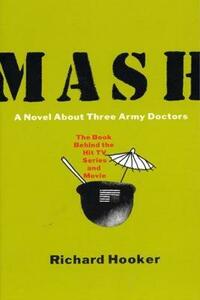Take a photo of a barcode or cover
Extremely dated. The characters aren't very distinct, and the story lacks depth. I think the goal was to use snaps shots of the day in the life in order to paint a broader picture. But in practice the book ended up feeling muddled and aimless. I read this because of how prominently the tv show featured in my childhood. I wanted to see what interesting extra perspective I could gain by reading the original source material. Such extra perspective was limited.
Is it better than the movie? YES!
Is it better than the series? No. But, the series was longer than the war itself and had a lot more time (and writers) to explore and create more characters.
And there was definitely a few things that they could not have put in the movie or the series, which was pretty fun stuff.
Is it better than the series? No. But, the series was longer than the war itself and had a lot more time (and writers) to explore and create more characters.
And there was definitely a few things that they could not have put in the movie or the series, which was pretty fun stuff.
Well, this was cute. A bit dated in almost every respect, and somewhat juvenile, but it was a nice trip down memory lane.
MASH was thought provoking, uproariously funny, and surprisingly educational. I learned a good amount about military rank, biology, war surgery, golf, and football, just to name a few subjects.
I never watched the MASH tv show so I didn’t really know much about the premise before this book. The characters were only semi-likable and no one story was really all that well defined except the football game. It seemed weird to give more attention to that than to most of the medical procedures and the interrelationships of the hospital workers. It was a really short book and there was not a whole lot of character development outside of the main guys. I am a little intrigued to give the show a shot now, but this book was not that exciting for me.
Some of my earliest memories are of my parents watching M*A*S*H on TV. Apparently I used to bound out of my little bed and run around the coffee table to the tune of "Suicide is Painless." As a kid, I knew little about the movie and nothing about the book.
When I was in my teens or early twenties, I saw the movie and didn't really like it. I think that it was largely due to the fact that none of the actors were the same. It's interesting how that you can become so attached to fictional characters. However, I was able to ignore Hooker's descriptions of Hawkeye and Radar O'Reilly and the rest of the crew and just picture them as I have always done. I'm a booger I guess.
There were little differences to be sure.
I really enjoyed it, but I'm not sure if it would have really grabbed me if I didn't have an attachment to the show in the first place. I guess I'll never know. It is a good book in it's own right, but maybe not something I would have considered. The first twelve of so chapters are largely episodic and could almost work as short stories. Towards the end, however, it becomes less so and has a solid finish.
When I was in my teens or early twenties, I saw the movie and didn't really like it. I think that it was largely due to the fact that none of the actors were the same. It's interesting how that you can become so attached to fictional characters. However, I was able to ignore Hooker's descriptions of Hawkeye and Radar O'Reilly and the rest of the crew and just picture them as I have always done. I'm a booger I guess.
There were little differences to be sure.
Spoiler
In the book Hawkeye is married and Trapper John is single. There is a character absent from the show altogether--Dr. Augustus Beford Forrest a.k.a. the Duke. Major Margaret Houlihan is about the same but plays a minor role. Major Frank Burns is short-lived. Spearchucker Jones and Ugly John play larger roles, etc. etc. A lot of the antics were the same as those in the TV series and there was a large focus on the surgery.I really enjoyed it, but I'm not sure if it would have really grabbed me if I didn't have an attachment to the show in the first place. I guess I'll never know. It is a good book in it's own right, but maybe not something I would have considered. The first twelve of so chapters are largely episodic and could almost work as short stories. Towards the end, however, it becomes less so and has a solid finish.
I've seen and enjoyed the movie, and I love the T.V. series and so the book was very much like I expected. It was a good and worthwhile read.
I'm a huge MASH fan from way back, as far as the movie and TV show are concerned. So when I saw MASH: The Novel at a used bookstore, I knew it was time to complete my full MASH experience.
As a comic novel, the book contains a fair amount of zany antics and biting cynicism. Many of the things you saw in the movie are in the book in far different shapes, and while I can't say the novel has quite the same aims as the TV show, I can say that this is where its moments of blackness spring from.
I enjoyed the book immensely, basking in the constant stream of character description and hijinks. But in the end, I'm not sure what it all added up to, what its purpose was, other than to point out the surgeons survived any way they could. The show certainly hammered that home enough, but I kept feeling there was a darker undercurrent, a hopelessness in the book, that it never quite let see the full light of day. And that may have been the key to understanding the whole intention of the story.
As a comic novel, the book contains a fair amount of zany antics and biting cynicism. Many of the things you saw in the movie are in the book in far different shapes, and while I can't say the novel has quite the same aims as the TV show, I can say that this is where its moments of blackness spring from.
I enjoyed the book immensely, basking in the constant stream of character description and hijinks. But in the end, I'm not sure what it all added up to, what its purpose was, other than to point out the surgeons survived any way they could. The show certainly hammered that home enough, but I kept feeling there was a darker undercurrent, a hopelessness in the book, that it never quite let see the full light of day. And that may have been the key to understanding the whole intention of the story.



